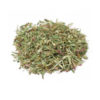Description
Several laboratory and animal studies suggest that echinacea contains active substances that boost immune function, relieve pain, reduce inflammation, and have hormonal, antiviral, and antioxidant effects.
Scientists from the ‘University of Connecticut School of Pharmacy’ reviewed over a dozen studies on the effects of Echinacea on people’s risk of catching a cold. They concluded that echinacea can reduce a person’s chance of catching a cold by 50%. They also found that the popular herbal remedy reduces the length of time a cold lasts by 1.4 days. They published their findings in The Lancet Infections Diseases (July 2007 edition).
It is traditionally used for treating
- urinary tract infections
- vaginal yeast (candida) infections
- ear infections (also known as otitis media)
- athlete’s foot, sinusitis
- hay fever
- slow-healing wounds
- indigestion
- ADHD
- genital herpes
- gum disease
- malaria
- migraines
- septicaemia
- rheumatism
It contains phenols, active substances which control the activity of a range of enzymes and cell receptors, and protect the plant from infections and UV radiation damage.



